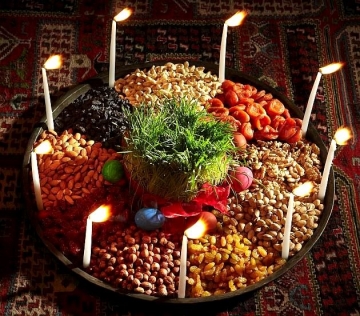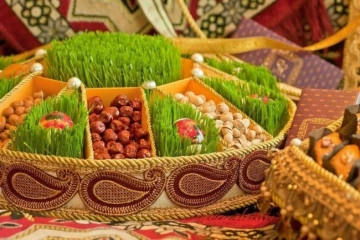Semeni (Azerb. Səməni) - sprouted wheat (malt), one of the main attributes of the Novruz holiday, which is celebrated in Azerbaijan and Turkmenistan on March 20-21. It is a symbol of spring and fertility, prosperity and prosperity.
It also has magical and cultic meanings.
In ancient times, semeni were prepared mainly from the seeds of sown wheat. Semeni, grown in artificial containers, made it possible to check the quality of the seeds that were being prepared to sow in the spring. If the semeni ripened well and grew to the desired size, then this meant that a good harvest would be born. Sometimes semeni was made from other cereals, such as barley.
Semeni is one of the main and obligatory attributes of the festive table, along with shekerbura, baklava and gogal. It is believed that semeni must be grown at home for abundance and prosperity at home this year. At the same time, experts consider it wrong to buy ready-made semeni in the markets.
A special rite of preparing semeni is called “Semeni toyu” (Azerb. Səməni toyu) (Russian “Semeni's wedding”) and is accompanied by ritual national songs and dances.
Semeni usually start cooking two weeks before the Novruz holiday, which is celebrated on March 20-21. Wheat is collected in cheesecloth in a ball and soaked for several days. At the same time, the water is changed every day. At the end of the soaking process, the wheat is laid out on a tray or any other dish of your choice and regularly sprayed with water. Just by March 20, the semeni grows to the desired height, which fluctuates within 20 cm.
Surety rite
There are many rituals associated with semeni in Azerbaijan and, depending on the regions, they differ from each other. In particular, in the Guba region, an interesting rite is widespread, according to which on the last Wednesday of the Novruz holiday, non-fruiting fruit trees are “bailed out”. The process of bailing consists in the fact that someone, taking an ax, intends to cut down a tree that does not bear fruit. At this time, another person approaches him and asks about the reason for his intention, to which he replies that the tree does not bear fruit. Then the opponent of the felling begs the first not to cut the tree and takes him on bail until next year. This is the case with all non-bearing trees, and as a result, none of them is cut down.
Infertility treatment
Another of the rituals using Semeni is associated with the treatment of infertility in women. It is believed that if a married man with a family holds a matured Semeni over the head of a barren woman and spills water on her head, which was sprayed with this Semeni, and another person will cut the Semeni sprouts and throw them on the woman's head, while saying: “ Ay bunu göyərdən, bu gəlini də göyərt »rus. “If you have raised this, help to raise this bride too,” the barren woman will soon become pregnant.

